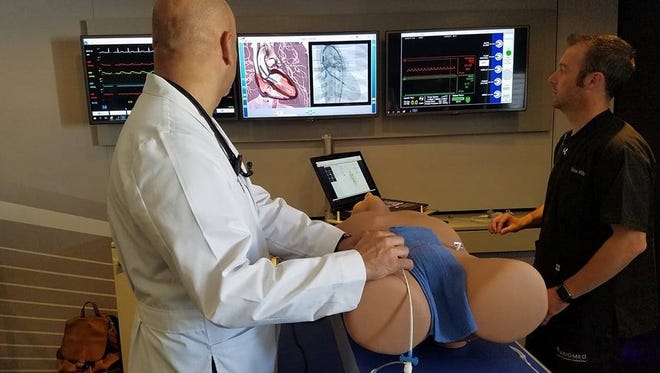Beebe staff gets hands-on experience with lifesaving device

For a day, a mobile unit filled with cutting edge medical technology sat right outside Beebe Healthcare in Lewes.
The close access to training was a handy way for doctors and nurses to learn more about lifesaving practices on a new device called the Impella, which has already saved four lives since it was first introduced to Beebe three months ago, the hospital says.
Mobile training access is very important, said Dr. Mouhanad Freih, an interventional cardiologist at Beebe Healthcare, because it gives the hospital staff the ability to get hands-on training without having to travel.
"It is very important," he said. "It is very important to train our staff, physicians and nurses."
READ MORE: Beach injuries can ruin a good day, change a life
READ MORE: Beebe Healthcare announces $180 million expansion
The Impella device, created by Abiomed, a medical supply company, is designed to help pump blood in patients' hearts after they experience cardiogenic shock, which is when the heart cannot pump enough blood to meet the body's needs.
"We love that the lab is mobile," said Rachel Swick Mavity, a communications specialist with Beebe. "We don't have to send our people anywhere. They can just take their breaks and come down here and learn about it."
Freih was one of the many doctors who were learning about devices supplied from Abiomed when the mobile lab came to Beebe for the day Wednesday.
There were stations throughout the lab where nurses and doctors could learn more about the device and hear stories from those who have received it.
Beebe and Christiana Hospital are the only locations in Delaware that use the device, said Ryan Willis, with Abiomed.
The fact that Beebe is able to use the lab is crucial to learning more about the device, he said.

READ MORE: Care for the community: AGH breaks ground on cancer center
"This will simulate the device being put in and human dynamics, it will simulate different alarms, we can do echo, we can do a lot with this," Willis said of the lab. "It is about as close to simulating a real patient as we can get.
"All of the screens you see are touchscreen, they’re interactive, so people can come in and see different things that are going on."
Freih said it is very important that the mobile lab comes to Beebe.
"To be able to simulate as close to real life to teach staff, physicians, residence, fellows technique and troubleshooting the device, it’s just amazing," he said.

READ MORE: Riverside hospital move cuts ambulance trips to PRMC
Without the device's assistance, Freih said the mortality rate for people with cardiogenic shock is 50 percent, but with the device, they have a survival rate of 80 percent.
The procedure to administer the device is less complicated than installing a heart pump, he added, and the procedure uses the same technique of catheterization.
One of the times the procedures was used, Freih said, was for a young patient who was unable to get blood flowing to the brain and other vital organs.
But with the device, the doctors were able to get his blood flowing once again, saving the patient's life.
"We are very happy," Freih said. "If this device was not at Beebe, despite what we have currently in ventral procedures, this patient would not have survived. We are excited to provide this service."
That, he added, is one of the many reasons why it is important to have the training lab come out to Beebe, so more doctors, nurses and techs could learn about this device.
On Twitter @hughesg19